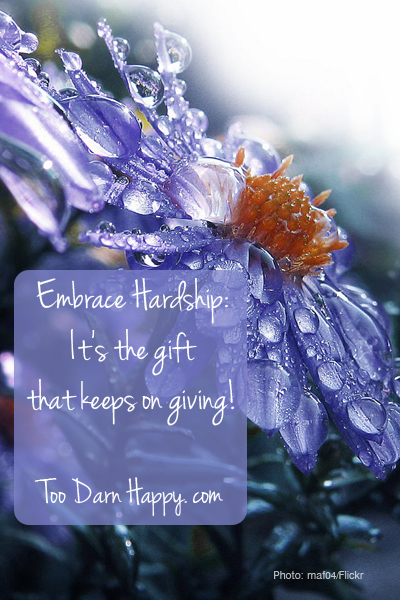You avoid hardship like the plague, and you double those efforts when it comes to keeping the path smooth for your children.
After all, it’s hardship.
Why bother to go through the challenge of saving up to pay for something you want when you can whip out the credit card and enjoy that shiny new toy right now?
Why make your kids do chores when they have so many other important things going in their lives?
Really, what kind of monster forces their children to—gasp!—help around the house?!
*Sigh*
Here’s the thing: you are the sum total of your experiences.
If, in those experiences, you and your offspring are never challenged, you will never grow in your skills, abilities, patience, wisdom, and so much more.
Hardship of one kind or another is bound to be a pretty regular part of life, so rather than attempting to hide from or outrun it, I suggest it is time to embrace hardship.
Your intentions are good
You work hard and want to be rewarded for what you’ve done and how far you’ve come.
You love your children and want them to have an easier and better life than you had.
However, good intentions by themselves are not enough.
But you see hardship only as a source of pain
Humans tend to move towards immediate pleasure and away from imminent pain.
While that may sound terrific—who doesn’t like instant gratification?—giving this pre-programmed GPS free reign over your life will keep you from many rewarding and growth-inducing moments of your journey.
If you pull out all the stops to avoid hardship, you and your children run the risk of becoming fragile hothouse flowers that cannot withstand being buffeted about by strong words, chilled by cold shoulders, and roasted by hot tempers.
Having a personality like that makes for a most unsatisfying life, both for the individuals and those who live with them.
Hardship is a matter of perspective
People who have lived through a wide spectrum of adversity often look back on the experience as critical to their mental, spiritual, and/or physical growth.
Author Tim Kreider nearly died from being stabbed in the throat. In his book We Learn Nothing, he wrote:
Except for the ten or fifteen minutes during which it looked like I was about to die, which I would prefer not to relive, getting stabbed wasn’t even among the worst experiences of my life. In fact it was one of the best things that ever happened to me. After my unsuccessful murder I wasn’t unhappy for an entire year. Winston Churchill’s aphorism about the exhilaration of being shot at without result is verifiably true.
(To read more on this book and changing your life, check out this post by Eric Barker.)
Kreider found much deeper gratitude in being alive only after living through an attempt on his life.
Admiral William McRaven, a Navy SEAL for 36 years, gave an inspiring commencement address drawing upon the “lifetime of challenges crammed into six months” that was SEAL training.
Here is a snippet:
For failing the uniform inspection, the student had to run, fully clothed into the surfzone and then, wet from head to toe, roll around on the beach until every part of your body was covered with sand.
The effect was known as a “sugar cookie.” You stayed in that uniform the rest of the day—cold, wet and sandy.
There were many a student who just couldn’t accept the fact that all their effort was in vain. That no matter how hard they tried to get the uniform right—it was unappreciated.
Those students didn’t make it through training.
Those students didn’t understand the purpose of the drill. You were never going to succeed. You were never going to have a perfect uniform.
Sometimes no matter how well you prepare or how well you perform you still end up as a sugar cookie.
It’s just the way life is sometimes.
If you want to change the world get over being a sugar cookie and keep moving forward.
Making it through the minute-by-minute hardships of SEAL training helped shape the Admiral into the man he is today.
Chicken Soup for the Soul tells the story of entrepreneur Le Van Vu and his wife.
He survived imprisonment, the Vietnam war, and losing his home and businesses, and coming to America as a practically penniless refugee.
A relative had a bakery in a mall in Texas where Le and his wife took jobs.
For two years they slept in the back room, washed up in public restrooms, and lived mostly on bakery food, saving enough for a down payment to buy the business.
They remained apartment-less for another year, which enabled them to payoff the loan and own the bakery outright.
Le noted that if they had gotten an apartment, and spent the money that accompanies that responsibility, they never would have gotten the first $30,000 saved for the down payment.
How to embrace hardship
Practice gratitude. Ask yourself what lesson(s) can be learned and applied later or what positive situation this hardship now creates. In the first story above, the author applied gratitude immediately, every year thereafter on his “stabbiversary” (his term), and he also attempts to maintain that thankfulness year round. On a much smaller scale, my hubby and I made lots of foolish decisions with our money. Since that horribly disheartening awakening, we have taught our daughters and others better financial management, and we’ve grown closer in our walk to debt freedom.
Build resilience. Every time you outlive a difficult experience, you build reference points to draw upon for next time. For the SEALs in training, this meant they created a huge reservoir of foundational blocks to stand upon when they encountered seemingly impossible to overcome obstacles in the real world. Again on a much smaller scale, we discovered years ago we were working frantically to keep our kids from experiencing the unexciting consequences of their behaviors. We set a new course. Each time there was a success, we gained renewed energy and enthusiasm, knowing we’d already lived successfully through behavioral challenges and were making a positive difference.
Take the long view. Le Van Vu and his wife saw more hardship than most of us will ever experience. Yet, they were grateful for their bakery jobs and knew that they could survive the years without an apartment to become business owners again because of the storms they had already weathered. Plus, they had built businesses before, and knew the time and vision it took. When you take the long view, you free yourself from the thicket of the emotional present and position yourself in a place of greater clarity. My hubby and I have used this time and again to make the right choice. As we have always told ourselves and our children, “Making the right choice is rarely easy, comfortable, or convenient, but it is the right choice.”
I’ll close with wise words from Dr. Wayne Dyer, “With everything that has happened to you, you can either feel sorry for yourself, or treat what has happened as a gift. Everything is either an opportunity to grow or an obstacle to keep you from growing. You get to choose.”
Question: What hardship has been a gift for you? Please share in the comments, as your experience may encourage another person!
|
 |




Funny, we didn’t call it hardship, we called it chores and budgeting! A most EXCELLENT article. There were many times my son thought he was going “to die” because of chores. Yet because of that “hardship” he has become an excellent employee, being promoted because of his hard work and faithfulness to showing up on the job, never calling in sick, always filling in for someone who has to be out. Had he not been “forced” to stack that woodpile when he was 12….
We did too, Nan. Isn’t it great to see the growth in your kids from the “pain” to being responsible adults? Love your story!
Isn’t it great to see the growth in your kids from the “pain” to being responsible adults? Love your story!
By the way, I loved “Take the long view” and it made me realize I need to be more faithful to apply that to my weight loss journey. Rather than focus on what I haven’t accomplished yet, I can keep on keeping on by focusing on that long view! Did I tell you how much I liked this article???
nan recently posted…Who’s Your Daddy?
Yes, yes, that will be very helpful to your weight loss journey! So glad you liked this and found it useful, Nan.
On our recent home buying and furnishing purchasing journey we have used the long view extensively. We are working to keep within the budget, yet “buy well, buy once”. We ask “Does this fit into our lifestyle, budget, and especially is it something that will last and we’ll continue to enjoy?” If it doesn’t, it doesn’t come home with us.
Twitter: TheSeanaMethod
says:
I think this is very TRUE and very difficult all at the same time. None of us seeks pain and discomfort. But there is no doubt that adversity builds strength and character, which are with us forever. Especially hard as a parent, I think. It’s almost a good thing when my kids face problems I can’t fix, because then I can’t “swoop in”. We faced a big problem when renovating our house. I won’t go into details, but the fix ended up with us building a storm sewer on our street. If you don’t know, that’s about like buying a Maserati.. except for a pipe, which of course we hadn’t planned on. It was one of the most stressful times in my life, but it put other things in perspective.
Seana turner recently posted…A Fun Clutter Quiz
I agree, Seana. I have found and still find this mindset very difficult to maintain, especially in regards to my kids, even though they are adults. My sympathies on your house repairs. There aren’t a whole lot of projects that are less satisfying than those that are expensive and really don’t show.

However, they are always good for growth in some form.